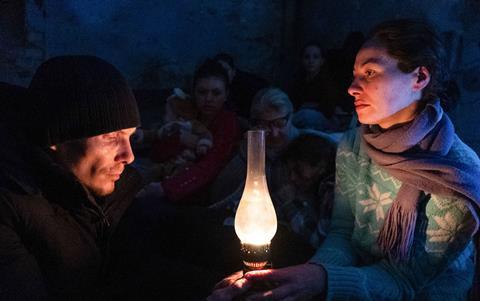Ukrainian journalist Mstyslav Chernov presents an unflinching account of the early days of the Russian invasion

Dir/scr: Mstyslav Chernov. Ukraine. 2023. 89mins
Ukrainian journalist Mstyslav Chernov is a fearless, front-line witness to history in 20 Days In Mariupol. When Russia invaded Ukraine in February 2022, he remained in the strategic port city capturing images of the escalating horrors and sending them out to a watching world. His extensive footage has now been shaped into a feature-length testimony that conveys the individual suffering and tragedy at the heart of this brutal, ongoing war.
Partly a film about the daily life of a war correspondent…and about the ethics of such a job
Chernov’s film has a thriller-like structure beginning as the first Russian tank trundles into Mariupol with the letter Z proudly displayed on its side.We then return to February 24th 2022, the last day of normality before the Russian invasion begins. ”Wars don’t start with bombs, but with silence,” Chernov observes in his thoughtful, eloquent narration. There is an eerie quiet everywhere. As the days tick past and the nightmare begins, it becomes a countdown to oblivion.
Chernov and his colleagues Evgeniy Maloletka and Vasilisa Stepanenko all attempt to convey the experience of a city under siege. They rush to the site of the latest attacks, take shelter from air strikes, speak to witnesses and fear for their lives in basement shelters. They are living the same war as the Ukranian population, and Chernov voices the general disbelief that this can be happening on the European continent in the 21st century. The escalation of attacks on civilian targets creates more suffering and some of the images are inevitably distressing—the tearful child declaring: “I don’t want to die”, the teenage boy blown to pieces whilst playing football, the pregnant woman rushed to what hospital care remains only to lose her child and her life. These are the human casualties of a systematic attempt to destroy infrastructure and crush all hope.
20 Days In Mariupol is partly a film about the daily life of a war correspondent – haring towards a situation that others are desperate to leave, trying to capture the truth of a moment – and the practicalities of finding a way to send footage in a city gradually starved of power and communications. It is also about the ethics of such a job. How do you show respect for the dying and distraught whilst still trying to capture footage that will make the world pay attention. Showing the reality of bodies being piled into mass graves or a child’s death on a makeshift operating table weighs heavily on Chernov’s conscience.
The inspiration and validation for what Chernov does comes from Ukrainian citizens who urge him to tell the world their story. He also sees his work as a way to counteract the often ludicrous Russian claims that stories of hospitals being destroyed and civilian casualties are merely “fake news” and “ information terrorism’. The greatest value of the film is the authenticity it carries as the work of someone who was in the line of fire.
Michelle Mizner has done a terrific job of editing the footage into a narrative filled with compelling stories and heartrending moments that doubles back to discover the fate of those who featured earlier. We also see the way in which the precious footage that Chernov and the team capture is used by broadcasters all around the world. Eventually, Chernov and his colleagues are the only reporters left in Mariupol as the Russians arrive, and their lives become endangered.
The film strives to capture the complexity of a war that brings out the best and the worst of the population. Chernov does include Russia’s dismissal of western news reports, and there is also footage of shops being looted by some Ukrainian citizens – much to the horror of their owners. At the film’s conclusion, titles tell the viewer that Mariupol fell on day 86 of the conflict and that 25,000 died in the siege. Ultimately, Chernov’s film is a compelling record of senseless destruction and death, and a salute to the enduring resilience of a people who refuse to surrender their home.
Production companies: Frontline PBS, Associated Press
Contact: Frontline PBS anne_husted@wgbh.org
Producers: Mstyslav Chernov, Michelle Mizner, Raney Aronson-Rath, Derl McCrudden
Cinematography: Mstyslav Chernov
Editing: Michelle Mizner
Music: Jordan Dykstra
























